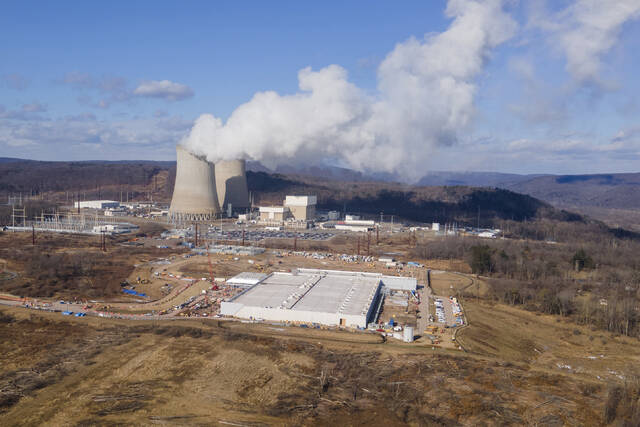
New report lauds Pittsburgh region for AI talent, innovation
作者:Tom Fontaine
A new report appears to support what many political and business leaders asserted at Tuesday’s Pennsylvania Energy and Innovation Summit: The state is well-positioned to be a key player in the growing artificial intelligence economy.
The Brookings Institution report, released Wednesday, rated Pittsburgh as one of 14 “emerging centers” in terms of AI readiness, while Philadelphia was one of 28 “star hubs.”
“Pittsburgh is very strong, and it clearly has some momentum,” said Mark Muro, a senior fellow at Brookings who, along with senior research assistant Shriya Methkupally, co-authored the report, “Mapping the AI economy: Which regions are ready for the next technological leap?”
That echoes the message delivered throughout Tuesday’s summit at Carnegie Mellon University, where officials announced plans for companies to invest more than $90 billion in data centers, energy and power infrastructure, and workforce and AI training projects across Pennsylvania.
“There is no better place than Pennsylvania to lead the next revolution in energy, technology and artificial intelligence,” U.S. Sen. Dave McCormick, the summit’s organizer, said during his opening remarks.
“As the nation’s second-largest energy producer and a global nuclear power leader, Pennsylvania is uniquely positioned to deliver the abundant, affordable energy that the growing AI and advanced manufacturing sectors demand,” added McCormick, a Republican from Pittsburgh.
The Brookings report rated the AI readiness of nearly 400 metro areas in terms of their availability of talent, strength of research and innovation, and adoption of AI by local companies.
The two “superstar” metros (San Francisco and San Jose) and 28 “star hubs” ranked in the top 25% among metros in all three areas.
The 14 “emerging centers” ranked in the top 25% in two of the three areas, but landed in the middle 50% of metros in a third area. In Pittsburgh’s case, the city rated highly in AI talent and innovation, but has work to do when it comes to companies adopting AI, according to the report.
“There is no doubt Pittsburgh is a formidable place, with universities like CMU and Pitt driving the research wave. But it is slightly trailing on adoption,” Methkupally said.
Despite being grouped in a tier below Philadelphia, Pittsburgh had a higher overall ranking (No. 7) than the City of Brotherly Love (No. 14), because of its prowess in innovation.
“In 2024, Carnegie Mellon University in Pittsburgh ranked second among universities publishing AI research, with an adjusted AI publication count of 349 — far surpassing the national average of 13,” the report said.
Pittsburgh also ranked first in high-performance computing usage from academic users.
As for adopting AI, just 2.8% of the Pittsburgh metro area’s companies are adopting AI technology (ranking 333rd out of 387 metros), 24% of companies maintain files in a digital format (307th) and 18% of companies are adopting cloud-based technology (297th).
“Pittsburgh has some small and medium-sized manufacturing firms that are as advanced as any in the world, but many are not and they aren’t upgrading. They won’t survive if they don’t upgrade,” Muro said.
In assessing conditions nationally, the report said, “While AI adoption and readiness activity is expanding rapidly, it remains highly concentrated in a narrow band of tech-oriented hubs along the coasts. Just two metro areas — San Francisco and San Jose — account for a disproportionate share of the nation’s AI resources, patents, startups and venture capital.”
“Yet, beyond these elite enclaves, a broader geography of rising metro areas — ranging from star hubs such as Seattle and Austin, Texas, to emerging centers such as Pittsburgh; Madison, Wisc.; and Tampa, Fla. — is now staking a real claim in the AI economy,” the report added.
Going forward, the report said federal and state governments can play an important role by investing in AI research, infrastructure, talent and innovation, but noted, “Ultimately, bottom-up initiatives will be critical. Local governments, research institutions, businesses and civic organizations must take ownership of their regional trajectories by aligning strategies with their distinct assets and ambitions.”
Audrey Russo, president and CEO of the Pittsburgh Technology Council, said the lower numbers for AI adoption surprised her, citing her dealings with chief information and technology officers at companies across the region who are working to adopt the latest technologies. She said she planned to dig deeper into the related data.
But, as a whole, she said the report painted a positive picture of what’s happening in the Pittsburgh region and its strengths in talent and innovation.
“We can’t take this report and say, ‘Yeah, we’ve arrived.’” We have to continue to work really hard and make sure we are moving ahead,” Russo said.
Russo said she hopes Tuesday’s Pennsylvania Energy and Innovation Summit will be a catalyst for growing “investment across every aspect of technology” in the region.
She recalled standing in a line at the summit with investors who had never been to Pittsburgh before and were interested in learning more. Perhaps that will translate to future investments, she said.
“The summit could truly be a gift that keeps on giving,” Russo said.
Tom Fontaine is director of politics and editorial standards at TribLive. He can be reached at tfontaine@triblive.com.
关于《New report lauds Pittsburgh region for AI talent, innovation》的评论
发表评论
摘要
相关讨论
- 康师傅黑了900亿 路透新闻, 大家知道了吗?
- Global Recycled Polyester Staple Fiber Market Booms Amid Growing Demand for Sustainable Textiles
- 人工智能应该被政府管制么?
- Global Neck Cream and Mask Sales Market Surges with Demand for Targeted Skincare Solutions and Anti-Aging Innovations
- [上海] Wiredcraft 招聘Javascript CSS前端开发;Node.js Golang Python后端开发程序猿!还有QA Tester;DevOps;项目经理等职位等你来投!!
